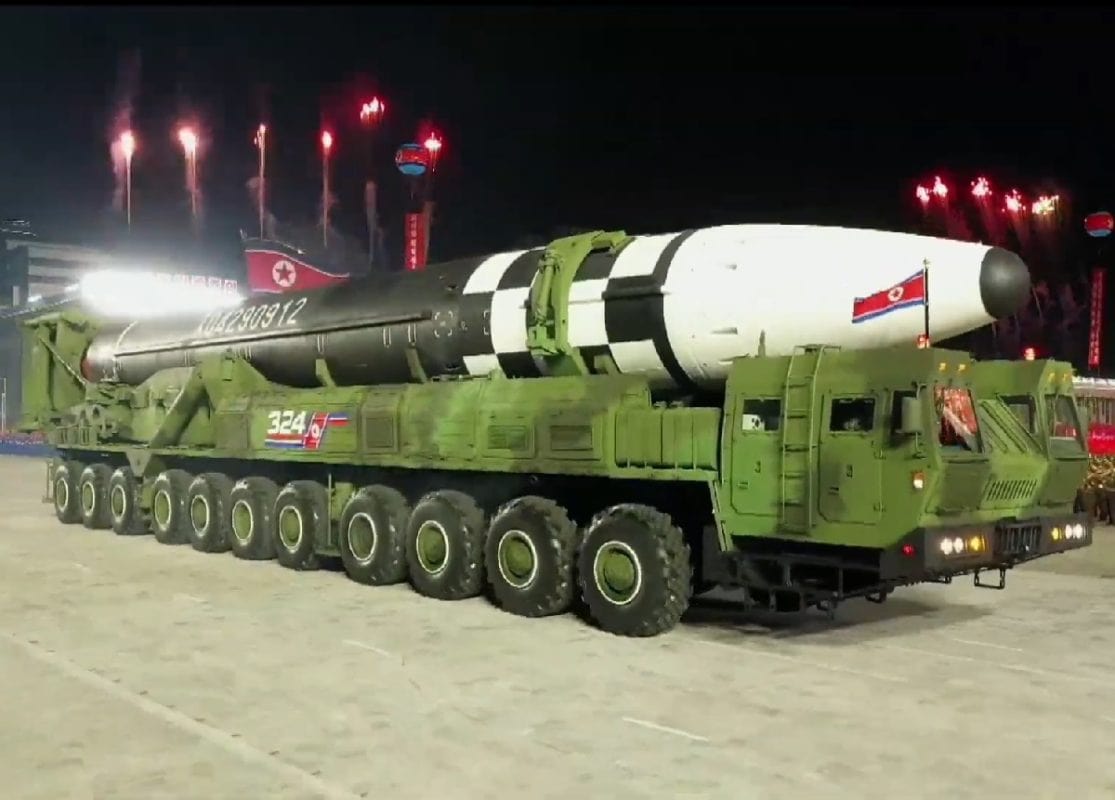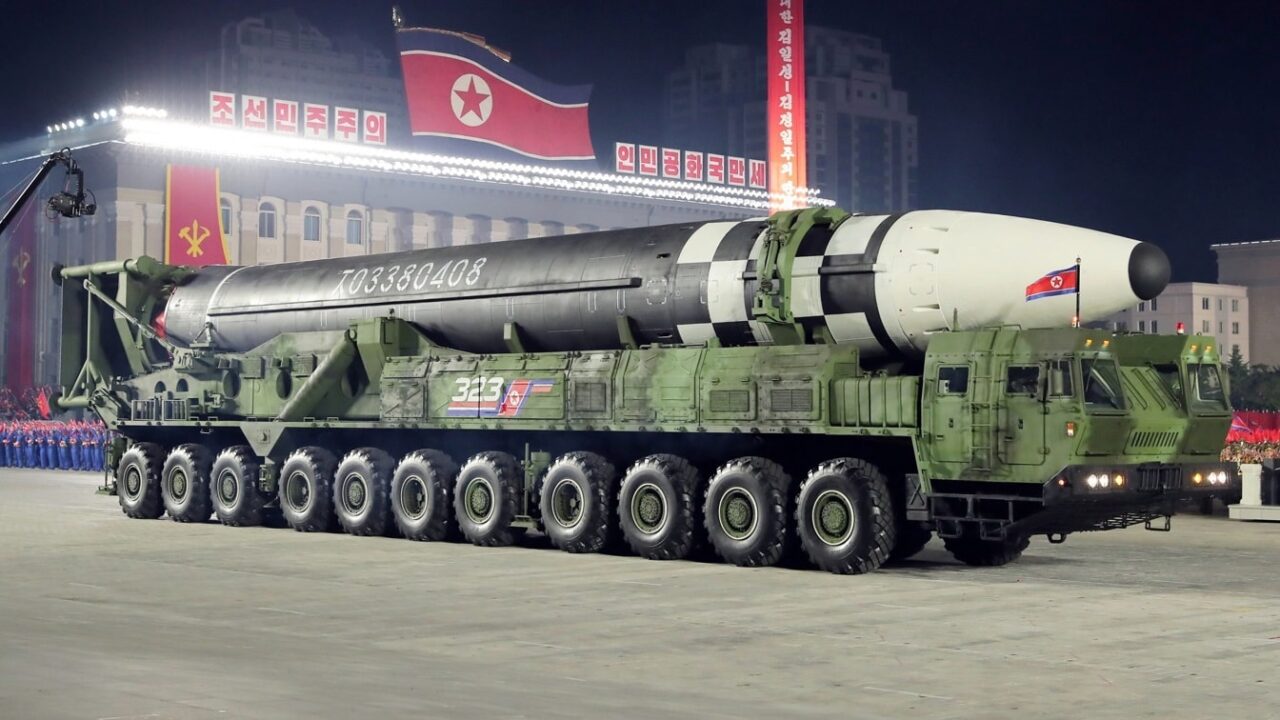North Korea Warns of Resuming Nuclear and ICBM Tests: Last week, Pyongyang implicitly threatened to resume highly provocative nuclear and ICBM tests while warning of “protracted confrontation” with the United States. Conducting such tests would significantly raise tensions on the Korean Peninsula, trigger calls for enhanced sanctions and allied security measures, and invigorate Japanese debate for acquiring enemy base strike capabilities. However, the lack of specifics or deadlines suggests the statement may be the opening move in a protracted campaign to alter U.S. policy and establish the parameters for negotiations. Pyongyang had similarly threatened to resume such tests after December 2019 but never did so.
During a January 19 Politburo meeting attended by leader Kim Jong-un, the regime declared that the U.S. “hostile policy” had “reached the line of danger,” necessitating a strong response. Though North Korea didn’t define its future actions, it affirmed existing policy to “strengthen and develop… more power physical mean” to counter U.S. actions deemed inimical to the regime. This was likely a reference to Kim Jong-un’s January 2021 directive to develop multiple-warhead ICBMs, hypersonic glide warheads, tactical nuclear weapons, nuclear-powered submarines, military reconnaissance satellites, and long-range submarine-launched ballistic missiles.
Pyongyang also vowed to reexamine its suspension of confidence-building measures, an indirect reference to Kim’s April 2018 statement that he would halt all nuclear tests as well as mid-range and intercontinental ballistic rocket tests since the programs were successfully completed. While some hailed the announcement as a tension reduction measure, North Korea is precluded by 11 UN resolutions from conducting any nuclear tests or ballistic missile launches, regardless of range.
The recent Politburo statement emphasized the importance of grandly celebrating the birthdays of previous leaders Kim Jong-il and Kim Il-sung (February 16 and April 15, respectively), suggesting the regime could conduct nuclear or missile tests on those dates.
North Korea justified any impending actions by blaming the United States for conducting military exercises and deploying strategic nuclear weapons in and around the Korean Peninsula. However, Washington and Seoul have cancelled, downsized, and constrained numerous military exercises during the past four years without reciprocal military or diplomatic actions by Pyongyang. Nor has the United States deployed any strategic assets, including aircraft carrier strike groups, strategic bombers, or fifth-generation fighters to the Korean Peninsula since May 2018.
Similarly, Pyongyang declared its January 14 launch of two KN-23 missiles was in response to Washington sanctioning six North Korean entities. However, North Korea’s previous 45 missile launches during 2019-2022 were not preceded by U.S. sanctions. Pyongyang habitually denounces others for precipitating regime actions that it was planning on implementing anyway.
Tension Serves Multiple Objectives
North Korea’s Politburo statement and the spate of missile testing in recent years serve several purposes. Pyongyang often projects a belligerent posture to rebuff any perceptions of weakness that opponents could exploit. Demonstrating continuing improvement in North Korean missile capabilities affirms leadership legitimacy. Raising tensions distracts the populace from domestic travails, validates the need to divert limited economic resources to the military, and justifies regime shortcomings in providing for the well-being of its citizens.
North Korea may also be seeking to influence U.S. policy. Pyongyang has raised brinksmanship to an art form by repeatedly escalating tensions to define negotiating parameters and extract maximum benefits. North Korea’s escalation is opportunistic rather than reactive to U.S. actions. By moving up the escalatory ladder, North Korea retains the initiative and controls the pace of the game, forcing the U.S. and others to respond. Raising tensions may gain Pyongyang what it desires—or at least expose fault lines in a coalition that North Korea can then exploit. Pyongyang believes it can force the United States to negotiate either by applying leverage directly on Washington or indirectly through its allies.
Repeated Warnings
Throughout 2019, North Korea warned that its patience for Washington to soften its policy would last only until the end of that year, when the prospect of settling issues would become “gloomy and very dangerous.” In late December 2019, Kim Jong-un announced that he no longer felt bound by his promise to President Trump to not conduct nuclear or ICBM tests. Instead, Kim warned that North Korea will “shift to a shocking actual action to make [the United States] pay for the pains sustained by our people” and counseled that “the world will witness a new strategic weapon to be possessed by the DPRK in the near future.”
Despite repeated threats, North Korea has not conducted a nuclear or long-range missile test since 2017. Uncharacteristically, the regime did not do so during the first year of the Biden administration, as it had during the Bush, Obama, and Trump administrations. Such major provocations were intended to drive the United States back to the negotiating table in a more supplicant manner.
However, the regime may have refrained from doing so because its draconian COVID restrictions would preclude the return of any North Korean diplomat who left the country to participate in negotiations. As such, Pyongyang might continue to hold off on a nuclear or ICBM test until COVID conditions allow for face-to-face negotiations.
Launch or Bluff?
Pyongyang may carry through on its Politburo message warning by conducting another nuclear test or launching the large, multi-warhead ICBM seen in the October 2020 parade. But doing so could incur the wrath of Beijing – North Korea’s protector and benefactor. In the past, China has been willing to accept stronger UN resolutions after Pyongyang conducted nuclear and ICBM tests. A major provocation prior to South Korea’s March 9 presidential election might also undermine progressive candidate Lee Jae-myung, who intends to follow President Moon Jae-in’s efforts to reduce pressure and offer benefits to Pyongyang.
Alternatively, North Korea could follow the recent Politburo statement with subsequent messages that alternate between warnings of drastic action in increasingly dire tones and signals of a willingness to resume dialogue, though on highly conditional terms. In the past, the path to negotiations with North Korea often passed first through provocation or crisis.
Kim Jong-un’s increasingly powerful sister, Kim Yo-jong, could play a key role in determining what happens next. She has assumed the role of regime “bad cop” in recent years. In 2020, she advocated several hardline positions while coyly holding out the possibility of resumed negotiations. She strongly recommended against another summit with the United States, instead advocating that North Korea augment its nuclear arsenal. However, her unspoken message was that her brother could overrule her.

Hwasong 16 ICBM. Image Credit: KCNA Screenshot.
The United States and its allies will anxiously await the upcoming North Korean birthday anniversaries for signs of impending nuclear or ICBM tests. In the meantime, Pyongyang will continue launching short- and medium-range ballistic missiles to demonstrate its growing military prowess while avoiding strong punitive responses from the international community. Doing so strengthens North Korea’s military capabilities as well as its leverage for the diplomatic battlefield.
Bruce Klingner specializes in Korean and Japanese affairs as the senior research fellow for Northeast Asia at The Heritage Foundation’s Asian Studies Center. Klingner’s analysis and writing about North Korea, South Korea, and Japan, as well as related issues, are informed by his 20 years of service at the Central Intelligence Agency and the Defense Intelligence Agency. From 1996 to 2001, Klingner was CIA’s deputy division chief for Korea, responsible for the analysis of political, military, economic, and leadership issues for the president of the United States and other senior U.S. policymakers. In 1993-1994, he was the chief of the CIA’s Korea branch, which analyzed military developments during a nuclear crisis with North Korea.

